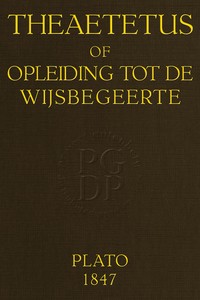| Author |
Plato, 428? BCE-348? BCE |
| Translator |
Burger, D. (Dionijs), 1820-1891 |
| Title |
Theaetetus
|
| Original Publication |
Amsterdam: P. N. van Kampen, 1847.
|
| Note |
Reading ease score: 66.4 (8th & 9th grade). Neither easy nor difficult to read.
|
| Credits |
Wouter Franssen, Jeroen Hellingman and the Online Distributed Proofreading Team at https://www.pgdp.net/ for Project Gutenberg (This book was produced from scanned images of public domain material from the Google Books project.)
|
| Summary |
"Theaetetus" by Plato is a philosophical dialogue written in the late 4th century BC. The text explores profound questions concerning the nature of knowledge and perception, featuring conversations primarily between Socrates and the young mathematician Theaetetus. The work delves into whether knowledge is based solely on sensory experiences or if it has a more substantial foundation, setting the stage for significant philosophical inquiry. The opening of "Theaetetus" begins with an account of Euclid and Terpsion discussing their recent encounters, particularly focusing on Theaetetus, who is recovering from wounds sustained in battle. As they ponder his impressive qualities, including his intelligence and bravery, they express concern over his condition. Socrates, emerging as a central figure, engages Theodorus and Theaetetus in a dialogue about the essence of knowledge. Theaetetus attempts to articulate his understanding of knowledge, leading to a philosophical investigation about whether knowledge equates to perception or if it holds a different meaning entirely. This sets a tone of inquiry and critical examination that drives the dialogue forward. (This is an automatically generated summary.)
|
| Language |
Dutch |
| LoC Class |
PA: Language and Literatures: Classical Languages and Literature
|
| Subject |
Knowledge, Theory of -- Early works to 1800
|
| Category |
Text |
| EBook-No. |
72108 |
| Release Date |
Nov 12, 2023 |
| Copyright Status |
Public domain in the USA. |
| Downloads |
95 downloads in the last 30 days. |
|
Project Gutenberg eBooks are always free!
|

